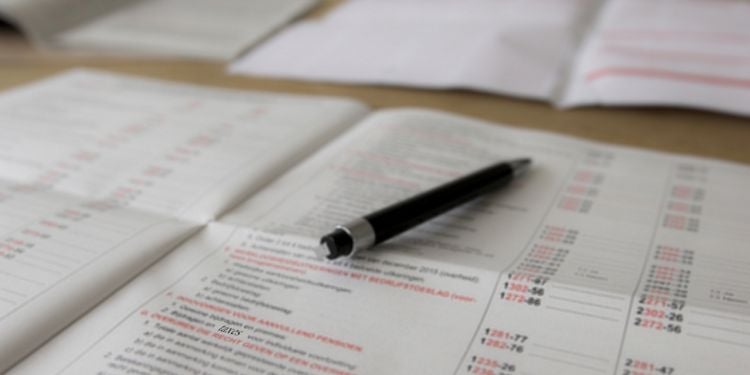
Wherever you live in the world, you'll be subject to taxes. In the Netherlands, how much you pay will depend on whether you own real estate and cars, as well as if you work and/or have any investments. While not an in-depth guide, this article will go over the basics of what to expect for taxes in the Netherlands.

VAT in the Netherlands
VAT, also known as BTW, is a sales or labor tax. It's set at 21% (and is called the high or general tax or tariff) but may vary depending on the goods or services. You won't have to calculate this yourself, as the price of the item or service you're getting already includes it.
Some items or services may be set at 9% for VAT, which is the low tax or tariff. Usually, things like food, drinks, books, medicines, magazines, newspapers, and agricultural products and services will have a 9% VAT charge.
You'll also see a 0% VAT charge. This is used for expat entrepreneurs who are in the Netherlands but conduct business in other countries (usually other EU countries). However, there are some cases where the 0% VAT charge is applied to services provided within the country, as they involve cross-border transactions. For example, if you're traveling or own a transport company, then the 0% VAT charge also applies to the international transport of passengers.
In addition, there are VAT exemptions. Some services in healthcare, education, childcare, and insurance and banking may not charge VAT.
The Tax and Customs Administration's (Belastingdienst) website has more information if you need to learn more.
30% ruling in the Netherlands
Highly skilled workers who come to the Netherlands specifically to work for a company may be eligible for the 30% ruling. Your taxable income is reduced by 30%. The government sees this as compensation for expats to use on moving and other costs, such as Internet fees for calling their families back home. It can also help with a higher cost of living in comparison to your home country.
Previously, the 30% ruling was applicable to the first eight years of your stay. However, on 1 January 2019, this period was shortened to five years. There was a two-year transitional period that ended on 1 January 2021. The ruling was further reduced to 30% tax-free in the first 20 months, 20% in the next 20 months, and 10% for the 20 months after that, as of 1 January 2024. There's also a minimum salary limit of €46,107 (or €35,048 if you have a Master's degree and are younger than 30) and a maximum of €233,000 for the tax-free allowance.
However, this decision was reversed before it came into effect. The 30% ruling will become the 27% ruling in 2027, and those who received the 30% ruling before 1 January 2024 will be grandfathered into the 30% ruling for 5 years. Those who received the 30% ruling after 1 January 2024 will get the 30% ruling from 2024-2026, and then they'll qualify for the 27% ruling if their income is at least €50,436. The minimum income salary limit for those under 30 with a master's degree will also increase to €38,388 on 1 January 2027. Do note that at the time of writing, the official effective date isn't final, as the law still has to be completely passed by the government.
Note that if you're already an expat in the Netherlands, you may not take advantage of the 30% ruling. In fact, you need to have lived 150 kilometers outside of the Dutch border for more than 16 months before working in the Netherlands.
You can't have lived in Belgium, Luxembourg, the UK, France, and parts of Germany as well. If you've already lived in the Netherlands before, you might not necessarily be disqualified from this ruling. You must:
- Have previously qualified;
- Lived 16 of the 24 previous months over 150 kilometers away from the Dutch border before your previous work;
- Have previously worked at least five years ago.
If you change employers while on the 30% ruling, it'll remain valid, so long as you still meet all the conditions. You won't have to submit a new application.
Income taxes in the Netherlands
Income tax rates in the Netherlands are relatively high when compared to the rest of the world. As of 2024, the brackets are as follows:
- €0 to €38,097: 9.32% (premium national insurance: 27.65%);
- €38,098 to €75,517: 36.97%;
- Over €75,518: 49.50%.
The premium national insurance is used for social security. 17.9% goes towards the General Old-Age Pensions Act (AOW), 0.1% goes towards the General Surviving Relatives Act (ANW), and 9.65% goes towards the act on long-term care (Wlz).
Available tax credits
The income tax rates may seem high in this country. However, do note that your personal allowances can be deducted, which makes paying income taxes a bit more reasonable. For instance, you can get tax credits for having children and starting your own business.
Here are some instances where you can get tax credits (the amounts listed are the maximum amounts):
- General tax credit (for everyone under the state pension age): €3,362 (for incomes up to €28,812; those earning over €75,518 get €0 tax credit);
- Employment tax credit (for everyone under the state pension age): €5,532 (for incomes up to €39,957; those earning over €124,934 get €0 tax credit);
- Personal tax credit for lower incomes: €2,950;
- Personal tax credit for a partner without income (born after 1 January 1963): €379.
How to register for taxes in the Netherlands
When you first arrive in the Netherlands, you'll have to fill out something called an M form. Considering that it's all in Dutch, you may want to consider having an accountant handle that for you.
However, you can also receive help from the Tax and Customs Administration for free. Simply call them at 0800 - 0543, and you can make an appointment at one of their locations.
There are other ways to receive free or affordable help with your M form. You can ask Dutch friends or family members who are familiar with the form; just make sure to thank them properly for their help (perhaps treat them out to dinner afterward). Libraries and local social organizations also offer assistance with the M form.
Conditions for registering for taxes in the Netherlands
Every year, you have to file your taxes before May 1st. The only exception is your first year, where you'll have to turn in the M form instead.
You can find the annual tax form on the Belastingdienst's website. Do note that you need a DigiD to log onto their website, so sign up for one as soon as possible. You'll need a BSN number to do so. Considering that you'll need your DigiD to do a number of administrative work, plus other things such as access to your health insurance account, it's worth having an account.
Not only do you need a DigiD to access the income tax form, but you'll also need your jaaropgave (yearly financial summary) from your employer. You should get this through the mail at the end of the fiscal year.
Like with the M form, the annual tax return form (which may be the C form or P form, depending on your personal situation) is also all in Dutch, so it may be difficult to navigate on your own if your knowledge of the language is limited. You can try and go it alone, especially since the Belastingdienst can answer any questions you may have. However, they're not allowed to respond in English, so you may hit a dead end there.
Again, it may be a wise choice to hire an accountant. Not only do they know the language and can fill out the forms for you easily, but they can also find other ways to save you money.
Provisional taxes in the Netherlands
Once you've submitted your tax return, the Belastingdienst will send you a provisional tax assessment. This is a rough estimate of what you own or are owned, based on what you filled out for your tax return form. You can take action at this point by either paying the amount owed or by giving the Belastingdienst a bank account for the tax return to be deposited in. You can use either a Dutch or foreign bank account here.
Later, once they've actually calculated your tax information, you'll receive a final tax assessment. Depending on the final outcome, you may have to pay more to the tax authorities, or if you're lucky, you might receive more money back into your account.
Property taxes in the Netherlands
Have you bought property in the Netherlands? Then you'll be subject to property taxes. When purchasing the property, you might've noticed something called the "overdrachtsbelasting". This is the transfer tax.
While the transfer tax is a one-off payment, you'll have to pay an annual real estate tax (onroerendezaakbelasting). The amount you pay will depend on the estimated value of your property, or WOZ-waarde. In a lot of cases, the WOZ-waarde is an overestimate, so it may be worth your time to dispute that amount and, therefore, get your property tax lowered as well.
The amount you pay for property tax will depend on the municipality you live in, as they set their own rates. In general, you can expect it to be between 0.1% to 0.3% of your property's value. Don't worry, though, as your municipality will put that money to good use. Property taxes are used to improve public spaces and the local community.
For expats who rent out their properties in the Netherlands, they will be taxed on the WOZ-waarde. However, your mortgage amount is deducted from that. It can get complicated if you have property in the Netherlands and rent it out, but don't reside in the country, so consult with a tax accountant to make sure you're doing everything right.
Inheritance taxes in the Netherlands
If you're a resident of the Netherlands, you may be subject to inheritance taxes (erfbelasting), even if you're not a citizen. However, you do have the choice to adhere to the inheritance law in your home country instead.
The amount of inheritance tax you pay will depend on your relationship with the deceased. Generally speaking, you'll pay the most taxes on inheritances from people who aren't directly related to you.
For 2024, here are the inheritance tax rates for the various categories:
- Spouse/partner: tax-free up to €795,156. Beyond, it's 10% under €138,642 and 20% above that;
- Children/step-children/foster children: tax-free up to €25,187. Beyond, it's 10% under €138,642 and 20% above that;
- Grandchildren: tax-free up to €25,187. Beyond, it's 18% below €138,642 and 36% above that;
- Other cases: tax-free up to €2,658. Beyond, it's 30% below €138,642 and 40% above that.
Import and export taxes in the Netherlands
Whether you own a business in the Netherlands or you're sending/receiving items, you'll be subject to import and export taxes if they're coming from outside the EU. You may even have to pay other taxes, such as consumption tax.
For items traded within the EU, you're not free of fees. You won't have import duties, but you'll need to pay VAT. As mentioned before, VAT rates are set at 21%, 9%, or 0%, depending on the specific items.
Make sure you read up on specific duties before importing or exporting items to avoid surprises.
Taxes for the self-employed in the Netherlands
As a self-employed person in the Netherlands, you'll pay taxes differently than regular salaried people. However, what you pay will depend on the type of business you have. Self-employed people are called zelfstandigen zonder personeel, or ZZPers.
You can register your business with the Dutch Chamber of Commerce (Kamer van Koophandel or KvK) by first completing an online form and then booking an in-person appointment. Make sure you bring a valid ID and BSN number. As of 2024, it'll cost you €80.10 to register your company, and it's only payable by scanning a QR code with your phone. You can also pay with a debit or credit card if you go to the KvK office.
You can make your business a sole proprietorship (eenmanszaak) instead of a corporation. As a result, your business isn't a legal entity, so it's not separate from your own assets. This allows you to pay just income tax instead of corporate tax.
When you file your taxes, you can also get a private business ownership allowance. For 2024, you can deduct €3,750 from your profits. But do note that this amount will decrease yearly between now and 2036 until it reaches a total of €3,240. Other benefits you get include the startersaftrek (tax relief for new companies), kleineondernemersregeling (a VAT exemption for small businesses), and the MKB-winstvrijstelling (profit exemption for SMEs). To get these benefits, you must work at least 1,225 hours a year. It can be beneficial to keep track of your working hours manually.
If your business isn't a sole proprietorship, then you may have partners. In that case, you'll each pay income tax on the profits you made individually. This means you're all considered self-employed workers, which means you can get additional tax benefits, including the entrepreneur allowance.
If you have a limited liability company, then you're considered an employee. Your company will have to pay a corporate dividend and wage taxes for you. This business option has the least amount of tax benefits.
We do our best to provide accurate and up to date information. However, if you have noticed any inaccuracies in this article, please let us know in the comments section below.








